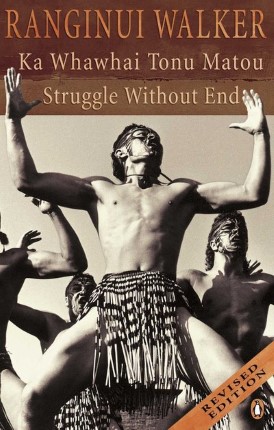
Ka Whawhai Tonu Matou: Struggle Without End—Ranginui Walker (1990)

Since the mid-nineteenth century, Māori have been involved in an endless struggle for justice, equality and self-determination. In this book, Dr Walker provides a uniquely Māori view, not only of the events of the past two centuries but also beyond to the very origins of Māori people.
Publication details
Walker, R. Ka Whawhai Tonu Matou: Struggle Without End. Auckland: Penguin, 1990.
About the book
Te Ao Māori lost a prominent leader, scholar and stalwart of Māori language and culture two years ago today (1 March 2018). Dr Ranginui Walker (1932-2016, Whakatōhea) was an esteemed academic who dedicated much of his life to documenting historical events of significance from a uniquely Māori perspective. Among his many prominent and influential roles, Dr Walker was a member of the New Zealand Māori Council; a member of the Waitangi Tribunal and a foundation member of the World Council of Indigenous People. He was a founding member of the Māori rights group, Ngā Tama Toa in the 1970s which promoted Māori rights and fought against racial discrimination; and was a Professor and Head of Department in Māori Studies at Auckland University. Dr Walker authored a number of respected works including this work, Ka Whawhai Tonu Matou: Struggle Without End, (1990) which documented two centuries of Māori struggle for justice, equality and self-determination. This book was an extremely influential publication in its’ day that explored Aotearoa’s history from the mid-nineteenth century arguing that Māori have been involved in an endless struggle for justice, equality and self-determination. The title, Ka Whawhai Tonu Matou was taken from the famous response by Māori leaders at the battle of Orakau (1863-1864) during the New Zealand wars, stating that they would never surrender.
Further information
This publication is part of the series Te Takarangi: Celebrating Māori publications - a sample list of 150 non-fiction books produced by a partnership between Royal Society Te Apārangi and Ngā Pae o te Māramatanga.
